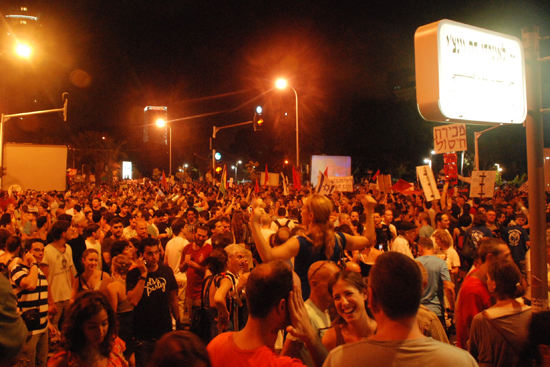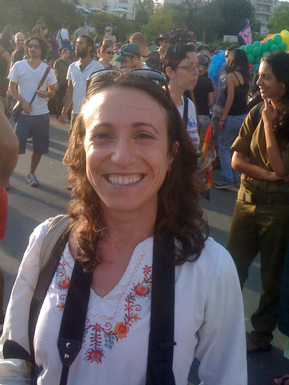The People Demand Social Justice in Israel
COM alum Melanie Takefman works to help them get it

Activist Melanie Takefman (COM’07) joined “stroller marches” and other protests in Israel last summer. Photos courtesy of Melanie Takefman
Protesters wave signs and pitch tents in city squares in hopes of drawing attention to corruption, the ever-rising cost of living, and the widening gap between rich and poor. While this may sound like America’s recent Occupy movement, these tent-filled parks were actually in Tel Aviv, Jerusalem, and Haifa, and the complaints were aimed not at bankers on Wall Street, but at politicians in the Israeli Knesset.
In July 2011—two months before the first Occupy Wall Street encampment in Manhattan—a group of young Israelis coordinated their efforts via Facebook and set up tents along Tel Aviv’s Rothschild Boulevard to protest the high cost of Israeli housing. Similar tent cities soon sprang up across the country, and in early August an estimated 300,000 Israelis (out of a population of 7.5 million) took to the streets of their cities in a mass demonstration against rising costs and shrinking social services. Their rallying cry: “The people demand social justice.”
“It was fantastic, fantastic news,” says Melanie Takefman (COM’07). “All the things I’d been working on for so long that no one wanted to listen to—finally people had woken up and realized there was a major problem.”
A longtime activist for social causes, Takefman worked from 2007 to October 2010 at the Association for Civil Rights in Israel (ACRI), Israel’s oldest and largest human rights organization. The association advocates for social justice issues such as freedom of expression, access to housing and health care, and the rights of women, migrant workers, and Arab citizens of Israel. “It’s a very good organization; it’s very respected,” she says, comparing it to the American Civil Liberties Union and adding with a laugh, “everyone hates ACRI, so that means they’re doing a good job.” She filled many roles there, including heading up outreach to international media, trying to interest foreign journalists in a variety of human rights issues within Israel.

Canada native Takefman (right), whose grandparents are Holocaust survivors, first moved to Israel in 2003 after graduating from McGill University and then spending a year volunteering in Bolivia. She landed a summer internship at the Media Line, a nonprofit American news agency established to provide balanced coverage of the Middle East and to promote better understanding between the Arab and Israeli journalism communities. After her internship, the agency offered her a full-time reporting job, and Takefman decided to stay in Israel. She also picked up work as a copy editor for the Jerusalem Post.
“I had this very idealistic and idyllic image of Israel until then, until I started living there,” she says. “My work as a journalist really shattered those ideals, and I realized there were a lot of problems in Israel and a lot of injustices.” Takefman felt the Israeli government was neglecting the rights of women, of Israel’s Bedouin community, and of Palestinians. “And I realized that I didn’t want to be quote-unquote objective,” she says. “I wanted to be active.”
So Takefman quit her journalism jobs and moved temporarily to the United States to earn a master’s degree in public relations at the College of Communication, with an emphasis in nonprofit public relations. When she finished the three-semester program, she moved back to Israel, and armed with her new skills in strategic communication, took a job with ACRI.
During her years with the association, she administered its English-language website, wrote grant proposals, helped to plan and promote human rights events, and launched its international media program. As a media spokesperson, Takefman—who speaks English, French, Spanish, and Hebrew—led foreign journalists on tours of poverty-stricken Bedouin villages in the Negev desert and of towns in the occupied territories. Her media outreach led to a front-page New York Times story about Highway 443, a road the Israeli government had closed to Palestinian traffic in 2002, disrupting countless Palestinian lives. The road has since been reopened to Palestinian drivers, albeit on a limited basis.
Although the work didn’t attract as much media attention, Takefman and ACRI also devoted time to social justice issues that affect all Israelis, filing petitions and pushing back against the government’s recent move away from social welfare and toward capitalism and private enterprise. Takefman left ACRI for a new job in 2010, but she continued to devote private time and resources to such issues.
When a tent encampment popped up last summer in her quiet middle-class city of Modi’in, 25 miles southeast of Tel Aviv, Takefman visited the camp and attended demonstrations. “The language of the protests was wonderfully positive and peaceful,” she says, a sharp contrast to Israel’s usual biting and cynical political rhetoric. When young parents began holding “stroller marches” to call attention to the high cost of raising children in Israel, Takefman not only buckled her toddler son into his stroller and joined the protests, she also met with protest leaders to help them draft a list of demands, including longer maternity leave, better day care subsidies, and cheaper infant formula.
Near the end of the summer, Takefman and her family left Israel for Greece, where her husband is now completing a yearlong fellowship at the American School of Classical Studies at Athens. She was disappointed to leave Israel in the midst of so much social change, but admits it’s a relief to be away from the tension. She considers Israel her home and she fully intends to return, “but it is a pressure cooker,” she says, “so it’s nice to get a bit of perspective by being away.” (The streets of Greece haven’t been exactly quiet, she adds, but she and her family aren’t Greek citizens, so they’re not much affected by the economic turmoil—and her son is accustomed to the sight of street protests, so he isn’t at all alarmed by them.) Takefman is using her time away from Israel to begin writing a book about her early experiences there. The book, she says, is primarily about the people she encountered as a reporter. “There’s a conflict in Israel that will not be resolved anytime soon,” she says, “and what I realized is that you have to focus on the people.”
Takefman plans to return to social activism when she moves back to Modi’in this summer. “It’s just what I’m driven to do,” she says. The tent protests and stroller marches are now over and the government is beginning to respond to citizens’ demands, but she believes that plenty of behind-the-scenes work remains—work that’s perfectly suited to her experience and determination.
Corinne Steinbrenner can be reached at cks@bu.edu.
A version of this story appeared in the spring-summer 2012 edition of COMtalk.
Comments & Discussion
Boston University moderates comments to facilitate an informed, substantive, civil conversation. Abusive, profane, self-promotional, misleading, incoherent or off-topic comments will be rejected. Moderators are staffed during regular business hours (EST) and can only accept comments written in English. Statistics or facts must include a citation or a link to the citation.